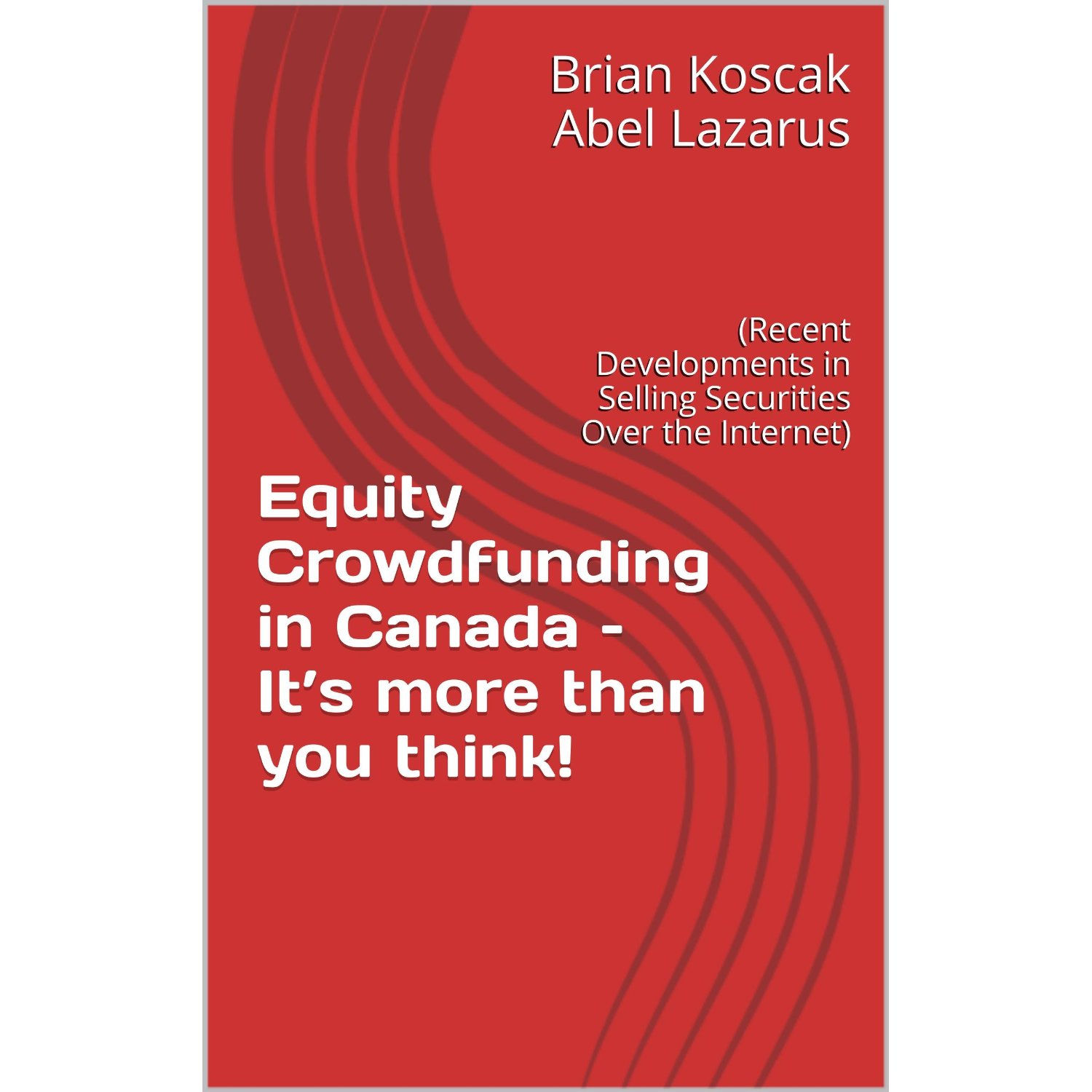
- Good News for Exempt Market Dealers Participating As Selling Group Members in Prospectus Offerings
By Brian Koscak and Peter Dunne
Back in December 2013, it looked like the Canadian Securities Administrators (CSA) might slam the door on exempt market dealers participating in prospectus offerings. However, recent changes suggest the door is still open. This article discusses what happened and where we are today.
2013 Proposed Amendments to NI 31-103
On December 5, 2013, the CSA published for comment a number of proposed amendments (the 2013 Proposed Amendments ) to National Instrument 31-103 – Registration Requirements, Exemptions and Ongoing Registrant Obligations (NI 31-103). The 2013 Proposed Amendments included proposed changes to section 7.1(2)(d) which maps out the permitted activities of an exempt market dealer. Below are excerpts from the blacklined version of NI 31-103 published by the CSA showing their proposed changes to section 7.1:
7.1 Dealer categories
. . .
(2) A person or company registered in the category of
. . .
(d) exempt market dealer may
(i) act as a dealer by trading a security that is distributed under an exemption from the prospectus requirement, whether or not a prospectus was filed in respect of the distribution;
(ii) subject to subsection (5), act as a dealer by trading a security that, if the trade were a distribution, would be exempt from the prospectus requirement;
(iii) Receive an order from a client to sell a security that was acquired by the client in a circumstance described in subparagraph (i) or (ii), and may act or solicit in furtherance of receiving such an order, and
(iv) act as an underwriter in respect of a distribution of securities that is made under an exemption from the prospectus requirement;
. . .
The proposed deletion of the phrase “whether or not a prospectus was filed in respect of the distribution” suggested a significant change in direction by the CSA.
The 2013 Proposed Amendments included corresponding changes to 31-103CP, the companion policy to NI 31-103 (the Companion Policy). In particular, section 7.1 of the Companion Policy introduced what appeared to be a clear prohibition:
Exempt market dealers are not permitted to:
– participate in a distribution of securities offered under a prospectus
. . .
The changes introduced in the 2013 Proposed Amendments clearly suggested that section 7.1(2)(d)(i) of NI 31-103 should be read as excluding exempt market dealers from any role in a prospectus distribution. This raised serious concerns among exempt market dealers who had been involved in prospectus distributions for some time.
2013 Proposed Amendments undermine support for exempt market dealer participation in prospectus offerings
Why were exempt market dealers concerned about the 2013 Proposed Amendments? Simply, the proposed changes undermine an analysis of NI 31-103 that supports an expansive interpretation of permitted exempt market dealer activities in connection with a prospectus offering. The analysis goes something like this:
– An exempt market dealer can trade in securities distributed under a prospectus exemption.
– Therefore, an exempt market dealer can trade securities to an accredited investor in reliance on the accredited investor exemption.
– Section 7.1(2)(d)(i) suggests that an exempt market dealer can trade in securities to an accredited investor under a prospectus in circumstances where the accredited investor exemption would be available.
– Therefore, an exempt market dealer can trade in securities distributed to an accredited investor whether or not a prospectus was filed in respect of the distribution of those securities.
This analysis puts exempt market dealers squarely into the stream of distribution flowing under a prospectus offering, subject to two restrictions:
1. An exempt market dealer has to stay within the bounds mapped out by the prospectus exemptions (e.g., dealing only with accredited investors); and
2. An exempt market dealer can only act as dealer, it can’t act as underwriter, in connection with a prospectus offering. [see footnote 1 below]
Based on this analysis, so long as an exempt market dealer lives within the restrictions, it can act on a trade even if a prospectus is filed. Unfortunately, the 2013 Proposed Amendments undermined the analysis.
Early support for exempt market dealer participation in prospectus offerings
Support for exempt market dealer participation in prospectus offerings goes back to the time before NI 31-103 came into effect. On February 29, 2008, the CSA published a revised version of what was still the “proposed” NI 31-103 (the 2008 Version). Section 2.1(1)(d)(B) of the 2008 Version clearly stated that an exempt market dealer is permitted to trade . . .
– in securities that are distributed under a prospectus if the distribution may have been made under an exemption from the prospectus requirement [emphasis added]
For some reason, the final version of NI 31-103 that came into force on September 28, 2009 features language in section 7.1(2)(d)(i) that seems to have conflated the language from the 2008 Version, so it now reads that an exempt market dealer may . . .
– act as a dealer by trading a security that is distributed under an exemption from the prospectus requirement, whether or not a prospectus was filed in respect of the distribution [emphasis added]
The final version of Section 7.1(2)(d)(i) set out above (which is currently in force) shifted focus from securities “distributed under a prospectus” (as originally proposed) to securities “distributed under an exemption from the prospectus requirement” (in the final wording). The original wording had the exempt market dealer distributing under the prospectus, where only the circumstances necessary to make a prospectus exemption available needed to be in place. The final wording has the exempt market dealer distributing under a prospectus exemption, where the prospectus itself is filed “in respect of” the distribution. The original proposed language was clearer. The final language suggests there may be two distributions taking place, which leads to some technical questions addressed later in this article.
2009 CSA Staff Notice 31-313 – FAQs
More support for exempt market dealer participation in prospectus offerings is found in CSA Staff Notice 31-313 – NI 31-103 Registration Requirements and Exemptions and related instruments – Frequently Asked Questions as of December 18, 2009 (the FAQs). In response to whether an exempt market dealer can trade prospectus qualified securities to clients, such as accredited investors, Section 7.1 of the FAQs states that an exempt market dealer could do so in circumstances where an exemption from the prospectus requirement would be available. That response is consistent with the original language proposed in the 2008 Proposed Amendments (see the first excerpt above). The FAQs went on to say that an exempt market dealer may provide the investor with a copy of the prospectus. All of this analysis and the succession of amendment proposals and commentary supporting exempt market dealer participation in prospectus offerings was cast into doubt by the 2013 Proposed Amendments.
Industry Reaction
In response to the proposed changes, the Private Capital Markets Association of Canada (PCMA) canvassed the views of its members. Exempt market dealers serve an important capital raising function in the exempt market and also contribute as selling group members in prospectus offerings. In fact, certain prospectus offerings would not happen in the first place but for the work of an exempt market dealer financing a company’s growth in its early stages, especially in the mining, oil and gas and technology sectors, prior to a company going public. Exempt market dealers should not be denied the ability to participate, in a limited way, in the prospectus offering of its issuer-clients. In fact, some companies with small market capitalizations are particularly reliant on an exempt market dealer’s ability to continue accessing the capital markets post public offering. These issuers, and other stakeholders, also benefit from having more dealers participating in the underwriting syndicate of a prospectus offering, particularly at the selling group level. In fact, certain prospectus offerings would not be completed but for the involvement of an exempt market dealer in providing a certain amount of sales, which should not be forgotten.
The PCMA presented this view in its response to the request for comments accompanying the 2013 Proposed Amendments. A copy of the PCMA comment letter can be found here.
October 2014 Proposed Amendments to NI 31-103
Now, fast forward to October 2014. The good news, as it turns out, is that the CSA were listening. The final amendments to NI 31-103 and the Companion Policy do not include the changes discussed above.
On October 16, 2014, the CSA published the final amendments to NI 31-103. The phrase “whether or not a prospectus was filed in respect of the distribution” was not deleted from section 7.1(2)(d)(i) and the status quo appears to have been maintained. Moreover, the addition to the Companion Policy that looked to exclude exempt market dealers from any participation in prospectus offerings was modified so that it only restricts EMDs from participating “as underwriter” in a distribution of securities offered under a prospectus.
Accordingly, the analysis supporting exempt market dealer participation as selling group members in prospectus offerings appears to be alive and well.
What do we take from this?
We can draw a number of conclusions from this situation.
1. The CSA appears to be listening to industry and shaping policy on that basis.
2. There are many voices in the CSA and many opportunities for disagreement. We probably witnessed an example of such disagreement in December 2013 when the tide shifted against exempt market dealer involvement in prospectus offerings as set out in the 2013 Proposed Amendments.
3. The CSA have not expressly accepted the argument outlined in this article, which means we should be realistic in our assessment of the current ‘state of play’ and recognize that there may be more changes in the future. For example, the CSA messaged in its recently published changes to NI 31-103 that it is considering the possible involvement of portfolio managers who are also exempt market dealers participating in the prospectus offering of investment funds. Stay tuned for further information on this front.
For now, we believe the door remains open for exempt market dealers to participate as selling group members in prospectus offerings. However, any exempt market dealer planning to pass through that door should bear in mind that a member of the CSA could raise an objection.
Other questions remain to be answered
Although the CSA appears to have backed away from the proposed changes, there remains significant uncertainty about how exempt market dealers can participate in prospectus offerings. For example, under Ontario securities law, the definition of the term “underwriter” excludes a dealer whose only interest in a transaction is limited to receiving the “usual and customary distributor’s or seller’s commission” payable by an underwriter or the issuer. Although this suggests an exempt market dealers can participate as a selling group member in a prospectus offering, the meaning of the phrase “usual and customary” commissions is unclear. Does this mean an exempt market dealer can only receive, for example, half of the commissions of the lead underwriter (i.e., IIROC member)? Moreover, what percentage of a prospectus offering can be sold by an exempt market dealer, as a selling group member, before a CSA member believes the exempt market dealer is acting as an underwriter? The answers to these questions will determine the line exempt market dealers can’t cross without becoming an underwriter. For now, we don’t have a bright line test, so this will continue to be a risk factor for exempt market dealers in connection with prospectus offerings.
These matters need to be discussed and considered further and the PCMA looks forward to its continued dialogue with industry and with the CSA to resolve these questions.
For now, the bottom line is the CSA have backed away from the 2013 Proposed Amendments. Only a few weeks ago, we were looking at the possibility of an outright prohibition for EMD participation in a prospectus offering. This is good news.
* * * *
Footnote 1 – Under NI 31-103, an EMD cannot act as a underwriter in connection with a prospectus offering; however, it can act as an underwriter in a distribution of securities under a prospectus exemption. Section 7.1(2)(d)(i) relates to an EMD acting as dealer, section 7.1(2)(d)(iv) relates to an EMD acting as underwriter. The distinction comes down to the definition of the term “underwriter” in the applicable securities legislation. In the Securities Act (Ontario), for example, a dealer is not an underwriter if their only interest in the transaction is limited to receiving the “usual and customary distributor’s or seller’s commission” payable by an underwriter or the issuer. What is usual and customary will be a focal point as EMDs participate in prospectus distributions. We return to this point later in the article.
Disclaimer
This blog is not intended to create, and does not create an attorney-client relationship. You should not act or rely on information on this blog post without first seeking the advice of a lawyer. This material is intended for general information purposes only and does not constitute legal advice. For legal issues that arise, the reader should consult legal counsel.
 Brian Koscak is a Partner at Cassels Brock & Blackwell LLP located in Toronto, Ontario and Chair of the Private Capital Markets Association of Canada (formerly, the Exempt Market Dealers Association of Canada). Brian is also a member of the Ontario Securities Commission’s Exempt Market Advisory Committee and Co-Chair of the Equity Crowdfunding Alliance of Canada.
Brian Koscak is a Partner at Cassels Brock & Blackwell LLP located in Toronto, Ontario and Chair of the Private Capital Markets Association of Canada (formerly, the Exempt Market Dealers Association of Canada). Brian is also a member of the Ontario Securities Commission’s Exempt Market Advisory Committee and Co-Chair of the Equity Crowdfunding Alliance of Canada.
Brian can be reached by phone at 416-860-2955, by e-mail at bkoscak@casselsbrock.com or on twitter @briankoscak. Brian also regularly writes about Canadian securities law matters on his personal blog at www.briankoscak.com.
 Peter Dunne is a Partner at the law firm of Cassels Brock & Blackwell LLP located in Toronto, Ontario. Peter practices in the area of securities law with an emphasis on securities registration and compliance and investment funds. Peter is the head of the Securities Registration and Compliance Group at Cassels Brock. Peter can be reached by phone at 416-869-5342 or by e-mail at pdunne@casselsbrock.com.
Peter Dunne is a Partner at the law firm of Cassels Brock & Blackwell LLP located in Toronto, Ontario. Peter practices in the area of securities law with an emphasis on securities registration and compliance and investment funds. Peter is the head of the Securities Registration and Compliance Group at Cassels Brock. Peter can be reached by phone at 416-869-5342 or by e-mail at pdunne@casselsbrock.com.




